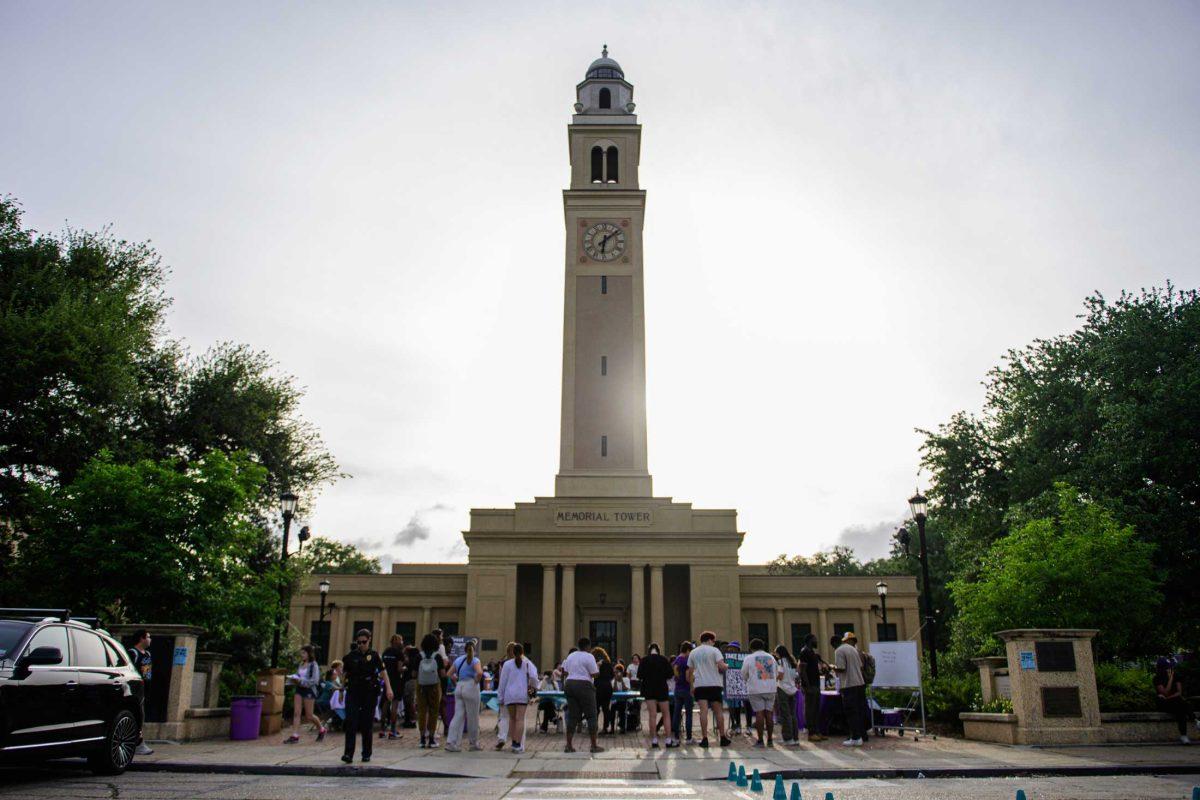LSU student organization Feminists in Action held its second annual “Take Back the Night” event on April 16 to raise awareness about interpersonal violence.
Over 330 attendees milled in the square created by two rows of tables beneath LSU’s Memorial Tower. At one table, FIA officers distributed free emergency contraception kits in both sparkly bags and discreet boxes. At another, volunteers handed out food and sold shirts.
Resource tables representing the 26 organizations that contributed to the event, including the LSU Women’s Center, the Lighthouse program and Sexual Trauma Awareness and Response, offered pamphlets and free goodies. Live music by the band Knife In My Back kept a lively pace directly in front of the tower.
Mariah Wineski, director of Louisiana Coalition of Domestic Violence and a former member of FIA, kept admiring the crowd. She reflected on a Take Back the Night from her college days, where the turnout was “me and my mom and anyone else I would beg to come.”
“If you don’t believe that social change is possible, I promise it is. I can see it,” she said, gesturing out to the audience, “and I have seen it.”
Take Back the Night initially began in the United Kingdom in the late 1800s as a protest against the fear women experienced walking alone at night. The Baton Rouge community has held the event for over 30 years until COVID-19 put an end to it, but FIA decided to revive it last year.
This year, the state is poised cut $7 million of funding from domestic violence shelters in Louisiana, and FIA looked to soften that blow for the Iris Domestic Violence Center. A thousand dollars, a little over half the proceeds from Take Back the Night, will be donated to Iris.
“Though FIA’s donation will only be a small portion of what Iris may lose in the coming year,” said the organization’s advocacy and activism chair Annie Sheehan-Dean, “we stand in solidarity with the organization and the critical services they provide to survivors.”
“One out of three women gets assaulted, and the biggest myth is that it’s the stranger in the dark alley,” said Jessy Abouarab, instructor with the women’s, gender and sexuality department, “which is not true.”
Teal, red, yellow, white and gray shirts pinned to a clothesline overhead swayed in a soft breath of wind. The WGSS department dished out fabric markers to people at their table, and Abouarab, overseeing the clothesline project, said the shirts would highlight people’s stories, and share messages empowering each another.
One volunteer hung a shirt reading, “It’s not your fault,” on the clothesline in the fast-fading light. Further down the line, a shirt bore, “You are not alone.”
Later, some of the shirts would be worn as hundreds of people sat in front of Memorial Tower and listened to survivors share their stories at the microphone. Anonymous survivors heard their experiences read aloud. It was nighttime, and four or five tissue boxes were passed through the crowd. The tower was lit, and flickering candles were held. Friends shared a comforting touch. Survivors’ voices cracked while speaking, and they began to cry. Listeners cried with them.
It was quiet, but no one was alone.





